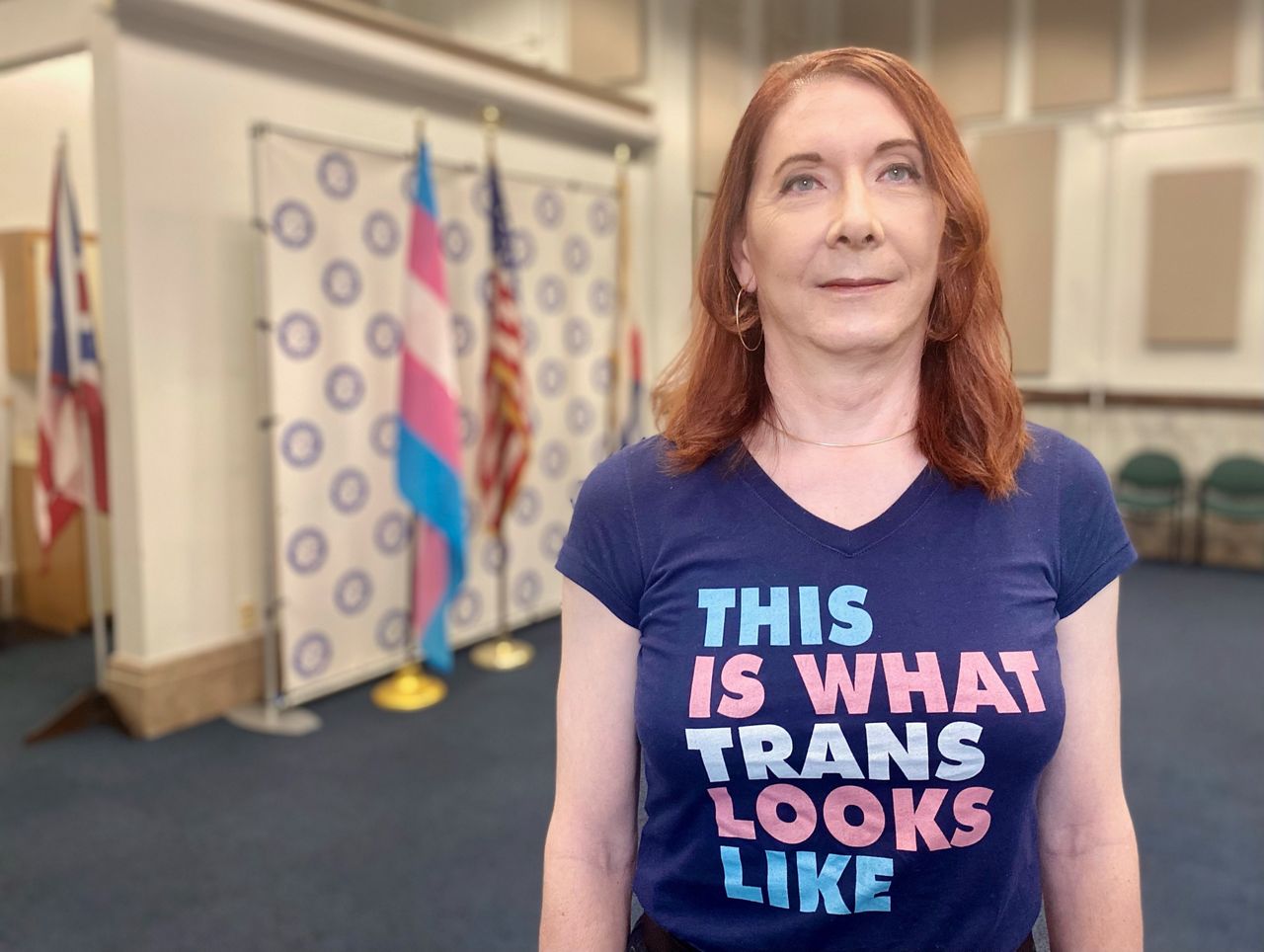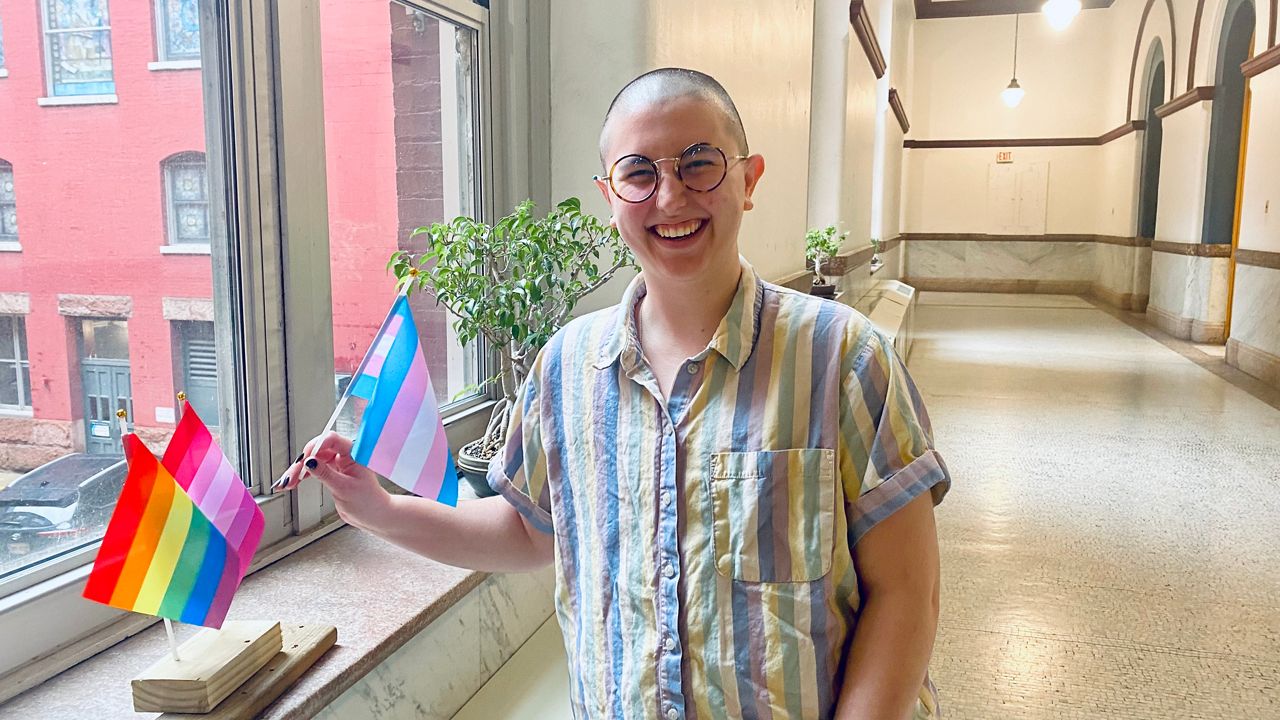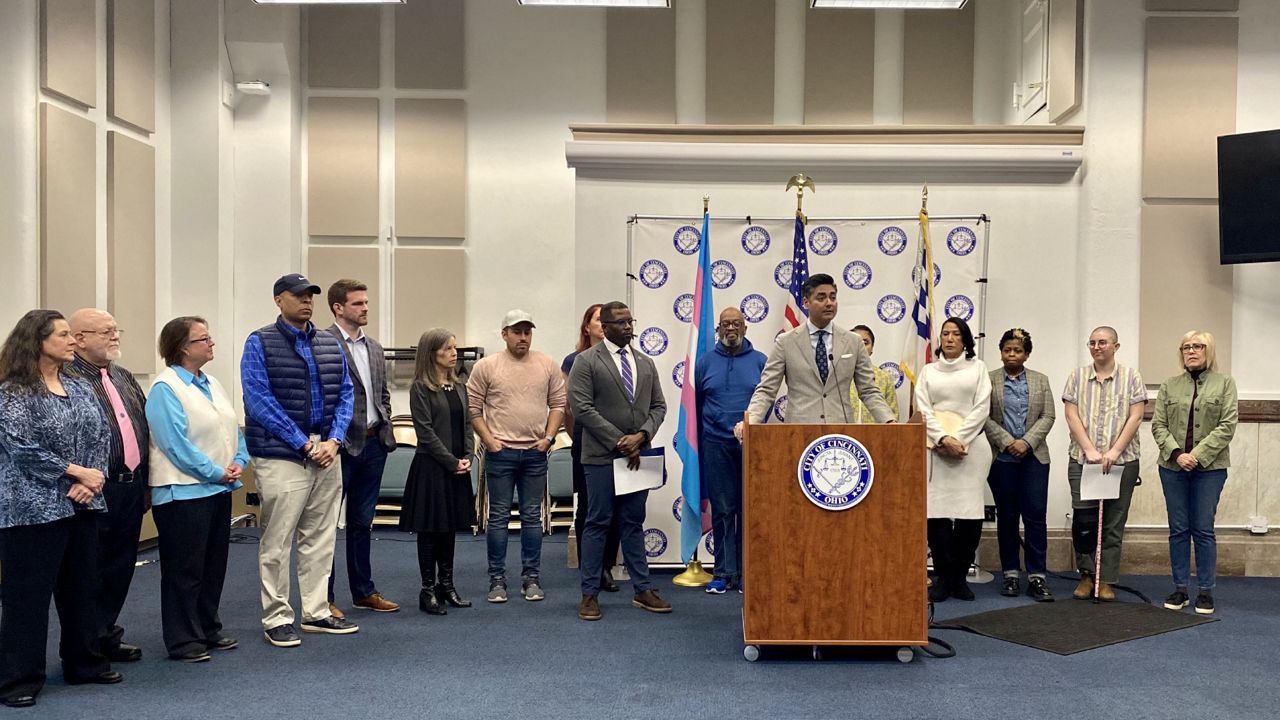CINCINNATI — As states across the country consider legislation viewed by some as an attack on transgender people, allies of trans men, women and nonbinary people gathered at Cincinnati City Hall on Friday to show support for that community.
What You Need To Know
- Friday marked International Transgender Day of Visibility on Friday with a press conference slamming proposed state laws in Ohio
- Two trans people who spoke at the event stressed how far the country has come in recent years but voiced fear of what these news laws could mean to their community
- The laws would bar trans athletes from competing in competitive sports in Ohio
- City leaders and advocates called on local allies to protect local trans people
The press conference marked International Transgender Day of Visibility. The annual happening aims to celebrate the lives of transgender people, who Mayor Aftab Pureval said have for too long had to hide in the shadows or deny their own identity.
“We as a city stand together in steadfast support of our transgender friends, family, and neighbors, but also in recognition of how much work is ahead of us in the fight for equality,” he added.
Pureval stood side-by-side with a group of elected officials and community leaders during the morning event. More than two dozen advocates and allies attended.
“We’ve got such amazing advocates and Cincinnati, members of our transgender community, members of our LGBTQIA-plus family,” Pureval added. He noted that many have risked their livelihoods and sometimes their lives, to “build a society where everyone is accepted with open arms and love for who they are, where children don’t have to grow up afraid to express their truth.”
On Friday night, the lit-up “Cincinnati” sign on the side of the Duke Energy Convention Center will glow in stripes of powder blue, light pink and white to represent the transgender pride flag.
Council member Reggie Harris, who hosted the press conference, said the city planned to raise the pride flag outside City Hall on Friday. But rain and Gov. Mike DeWine ordering flags lowered to half-staff across the state halted those plans. Instead, the city will raise it along with the traditional rainbow-colored Pride flag on June 1. June is national Pride month.
“It deserves to have its moment in the sunshine,” said Harris, who is openly gay and a longtime LGBTQIA-plus advocate.
‘Feeling safe’ in your own skin
Being able to live openly as trans or gay is something many LGBTQ people thought they’d experience in their lifetimes, according to Cathy Allison, a trans woman and member of the Transgender Advocacy Council’s board.
Allison said that she recognized herself as trans as early as 7 years old, even if she didn’t know what that term meant back then. She recalled not feeling comfortable expressing that part of herself growing up in rural Indiana in the late 1960s and ‘70s.
She met several trans women in the 1990s, but only a couple of them ever got involved in the community.
“The rest were afraid,” Allison added.

The “bad old days,” as she referred to them, meant experiencing “365 days of trans invisibility.” It caused her to deal with what she diagnosed as more than 50 years of internalized transphobia.
Allison credits the bravery of this generation’s young people with helping her come out of her shell. She praised them for refusing to wait for permission to express themselves.
“When I saw the kids coming out, it changed everything about how I wanted to (express being) trans,” she added.
Elliot Draznin came out as nonbinary just a few years ago. They were reluctant at first to ask others to use their preferred name or pronouns. Draznin credits a group of people they met in Cincinnati with creating a welcoming environment to speak up.
“It’s just so amazing to be in a place and feel safe,” Draznin added.
Draznin related their experience as being trans to growing up Jewish. They said people in both groups share similar experiences to persecution and a lack of acceptance: “They tried to kill us, and we survived, so let’s eat and party and enjoy life.”
“We are going to be as loud as we can,” they added. “The biggest importance of trans visibility is that when they are actively trying to kill us, to the extent it’s safe, say, ‘No, this is who I am. Here I am. Respect it.’”
New round of ‘anti-trans’ legislation makes its way to Statehouse
Despite the progress trans people have made in recent years, the community is under attack, Draznin said. It’s not just overt hate groups, like the ones targeting drag shows and other LGBTQIA-related events in northern Ohio. She believes the biggest threat right now is elected officials.
In Kentucky, state legislators voted overwhelmingly on Wednesday to overturn Democratic Gov. Andy Beshear’s veto of Senate Bill 150. The new state law essentially bans gender-affirming care for children. It also requires students to use the bathroom aligned with their gender at birth. School staff now has legal permission not to use a student’s requested pronouns.
The bill will go into effect in late June.
The Ohio General Assembly is currently considering a pair of laws — House Bills 6 and 8 — that critics also view as anti-transgender.
HB 6, also referred to as the “Save Women’s Sports Act,” would require schools and state-run and private colleges to designate separate single-sex teams and sports for each sex and to limit participation on teams. It would ban schools from knowingly allowing athletes identified as male at birth to be on sports teams or take part in competitions designated for females only.
HB 8 aims to create a “Parents’ Bill of Rights” that would require public schools to adopt a policy on parental notification on student health and well-being and class materials that feature sexually explicit content.
“The focus is to ensure that parents are empowered to be involved in their child’s education both inside and outside of the classroom,” State Rep. D.J. Swearingen, R-Huron, said of HB 8. “In Ohio, we prioritize parents taking an active role in their child’s life.”
Critics, such as Draznin, voiced concerns that passing the bill could force teachers and staff to out students to their parents or guardians by notifying them if their child asks the school to use a different name or pronoun than what’s listed on their school forms.

Draznin fears high rates of depression and suicide among the trans community will soar because of this type of legislation.
“It keeps me up at night,” they added. “We don’t have elders right now, because an entire generation was wiped out (by AIDS or suicide). And with our youth, we’re at risk of them looking around and thinking, ‘They hate me. Why do I want to exist in that?’ We can’t let that happen.”
The House Republican Caucus put forth HB6 and HB8 as part of a 12-bill package dubbed “Ohio is our Home.”
“The House Republicans are putting forth an agenda all about growing the economy, protecting Ohio families, and educating our communities,” said Speaker Jason Stephens, R-Kitts Hill, during a press conference on Feb. 15.
During that announcement, Stephens stated his view of the plan as a way for Ohio to attract and keep residents, particularly families.
But Pureval believes the opposite is true. The first-term mayor told the reporters Friday that supporting transgender rights and promoting equality, in general, isn’t just the right thing to do, it’s also good for business.
He stressed that being perceived as a welcoming community to all people gives Cincinnati a leg up on other cities when competing for businesses, top talent and other opportunities to move or expand there.
Pureval described the situation in Columbus as “people in power” trying to take away transgender people’s rights and “erase them.”
“When I’m out in other parts of the country talking about how great Cincinnati is, it’s very difficult to sell our city… when the General Assembly is making it very, very clear that trans folks that trans folks aren’t welcome,” he added.
Pureval called on residents to “stand on the side of equality,” to “make it clear to the world that in Cincinnati, we will not let hate win.”
Allison echoed those sentiments, asking allies to continue to help protect trans people and be willing to “get hit by the same rocks we are.”
Draznin called Friday incredible, partly because it provided a brief respite from what they called “continued attacks from Statehouse representatives.” But they also hope it sends a message to Columbus.
“It was an opportunity to say, ‘No, we don’t agree with what they’re doing. We’re going to make sure Cincinnati is a safe place for our trans siblings,’” they said.



